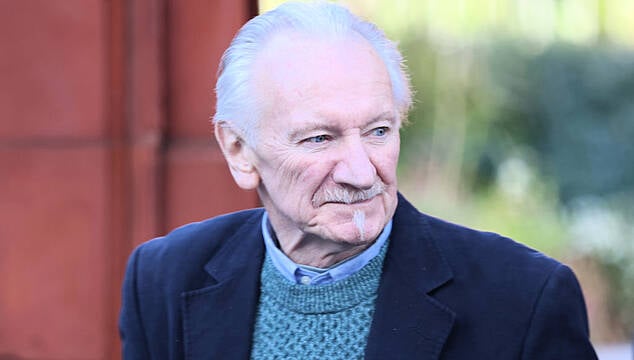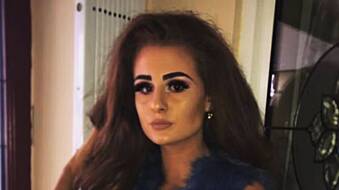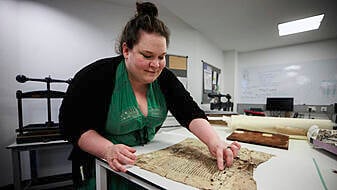The son of singer, Sinead O’Connor, absconded from Tallaght University Hospital while he was meant to be under 24/7 supervised care as a high-risk patient less than 24 hours before his body was discovered in a secluded area just outside Bray, Co Wicklow.
An inquest into the death of Shane O’Connor (17) heard the teenager had gone missing on the morning of January 6, 2022 from the hospital where he was being treated for a drug overdose following a number of suicide attempts.
His body was found by a workman the following morning on the edge of wasteland at the rear of the Corke Abbey housing estate in Bray.
A sitting of Dublin District Coroner’s Court on Monday heard that there was no healthcare assistant available at TUH to provide Shane with the required continuous supervised care on the morning he left the hospital shortly after he had been stopped by a nurse when trying to go outside for a cigarette.
The inquest heard that the singer, who died suddenly just 18 months later in London, had formally identified her son’s body to gardaí at the mortuary in St Colmcille’s Hospital in Loughlinstown on January 8th, 2022.
A sitting of Dublin District Coroner’s Court on Monday also heard she had brought her son to TUH’s emergency department when he was admitted to the hospital on December 29th, 2021.
Among those attending the hearing was the deceased’s grandfather, Seán O’Connor; his uncle, Sinead’s brother and the award-winning novelist, Joseph O’Connor and Shane’s father, the well-known traditional musician, Donal Lunny,
Others in attendance included Shane’s half-brother, Yeshua Bonadio as well as the singer’s former husband, John Reynolds.
Prior to his admission, Shane had been under the care of Tusla and had been residing at a care facility operated by New Beginnings in Newbridge, Co Kildare after living with his mother until the age of 11.
Profound regret
A consultant gastroenterologist who was responsible for Shane’s treatment at TUH, Anthony O’Connor, apologised for what happened to the patient under his care and said the teenager’s death had greatly affected all the medical team.
Dr O’Connor expressed his “profound regret and shame” that one-to-one supervision had been unavailable to the deceased due to challenges posed by Covid-19 restrictions which had resulted in 15 per cent of staff being out of work with the infection at the time.
“Although it was clear that he was unwell and troubled, his gentleness, kindness and creativity was apparent to all,” the consultant added.
The inquest heard Shane had been admitted to TUH after a drug overdose which had resulted in severe injury to his liver.
While his condition improved dramatically after treatment, Dr O’Connor said he continued to have “deep concern” for the patient as he had appeared quite determined about trying to take his own life.
However, he admitted he was wrong in not thinking that Shane posed a high risk of leaving the hospital unattended because he had been “pleasant and cooperative.”
A consultant liaison psychiatrist at TUH, Paula McKay, said staff had identified the need for constant supervision of Shane while he was in the hospital.
The inquest heard such supervision was being provided by a combination of hospital staff, New Beginnings carers and Mr Lunny until he tested positive for Covid-19 but it was not on a 24/7 basis including the two nights before he escaped from the hospital.
However, Dr McKay said she had not been informed about times when such supervision was not being provided, which could have escalated if she had known.
In reply to questions from the coroner, Cróna Gallagher, she said she believed Shane had met the criteria for being involuntarily detained under mental health legislation which might have arisen at a scheduled court hearing about his care on the day of his death.
The inquest heard that a new policy had been introduced in TUH following Shane’s death which prioritised high risk patients in need of 24/7 supervision which was reviewed on a daily basis.
A nurse raised the alarm that Shane was not in his room shortly after 10:30am, while security staff established from CCTV cameras that he was seen leaving the hospital around 10am.
Healthcare staff
At one stage, Joseph O’Connor said evidence that TUH had to withdraw the offer of jobs to 20 additional healthcare staff because the HSE had withdrawn funding for recruitment was “pretty shocking.”
“It’s an absolutely incredible state of affairs,” the novelist remarked.
Sinead’s father objected to detailed evidence being given by a witness about his grandson’s history of care.
Mr O’Connor said it was known that Shane had a difficult youth and questioned the need to go back further than his admission to TUH.
He said his daughter had often spoken to him about her son but he did not believe the inquest should “rake over dead embers” and just wanted it to focus on the “system that allowed Shane to escape from hospital.”
“I’d prefer if that is where we began and ended,” he added.
Mr O’Connor said Shane’s family accepted that all healthcare staff had tried to do their best for him.
He told the coroner that he wished to know why there was no protocol in place at the time and why a mentally ill child was not transferred to a psychiatric ward.
Mr O’Connor stressed that his family were not trying to cover up anything personal.
The coroner ruled that she had no wish to intrude on anyone’s personal life but some evidence needed to be heard about the treatment received by the deceased.
Dr Mary Rose McCarthy, a consultant psychiatrist at South Kildare Child and Adolescent Mental Health Services, subsequently gave detailed evidence about diagnosing Shane with mental and behavioural disorder, which she linked to his regular misuse of cannabis.
Dr McCarthy outlined how the troubled teenager, who was assessed with an IQ in the gifted range, was admitted to the Linn Dara in-patient psychiatric unit at Cherry Orchard Hospital in Ballyfermot, Dublin on six occasions between February 2020 and December 2021 for a total of 127 days, including one stay which lasted 42 days.
Support services
The psychiatrist said he had suffered at times from hallucinations and drug-induced psychosis.
The inquest heard that his mother had said there were long-term difficulties in getting her son to engage with any support services.
Dr McCarthy said Ms O’Connor had contacted her in August 2021 about how her son’s condition was “highly challenging.”
The witness said the singer had spoken of how she loved her son but was overwhelmed by the situation and unable to provide support to him at that time.
Dr McCarthy said she believed Shane could have improved if he could stop taking cannabis, but he was unwilling to give the drug up.
She also noted it was difficult to support him safely “in a residential setting.”
The psychiatrist became tearful as she expressed how “extremely sorry” she was that the teenager did not get a chance “to live out a long life and realise his thoughts and dreams.”
She said arrangements were being made for him to be admitted again to Linn Dara at the time of his death.
The inquest before a jury of six men and two women is due to conclude on Tuesday.
If you have been affected by any of the issues raised in this article, you can freephone the Samaritans 24 hours a day for confidential support at 116 123 or email jo@samaritans.org.
You can also freephone the national Bereavement Support Line run by the HSE and Irish Hospice Foundation at 1800-80 70 77 (Monday-Friday 10am-1pm), and the contact information for a range of mental health supports is available at mentalhealthireland.ie/get-support/.







